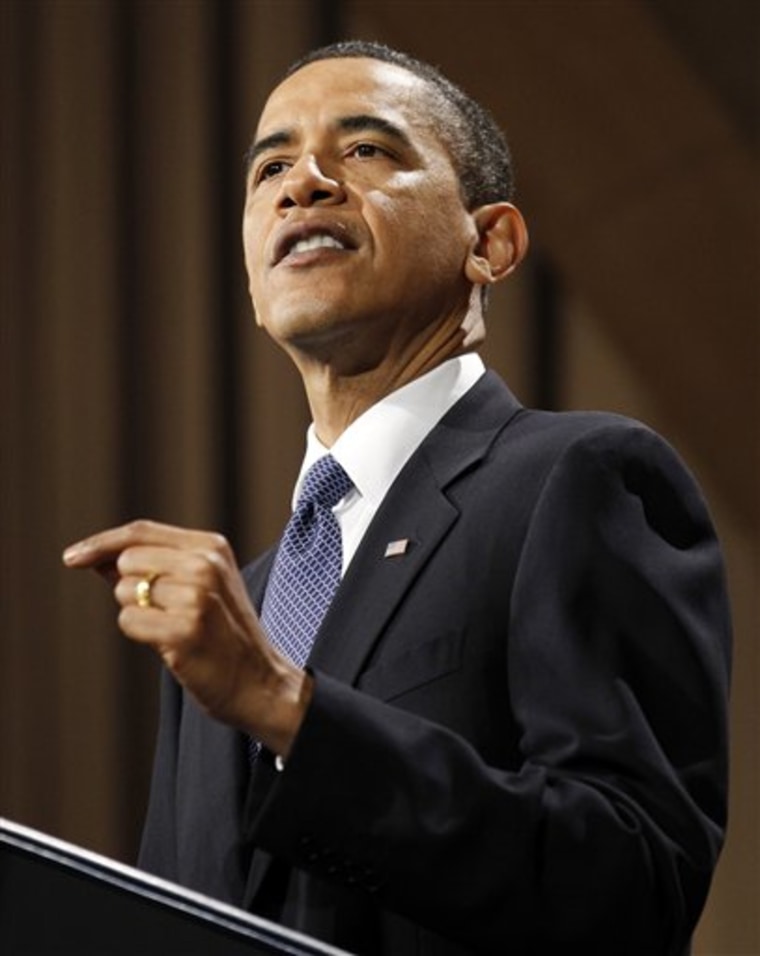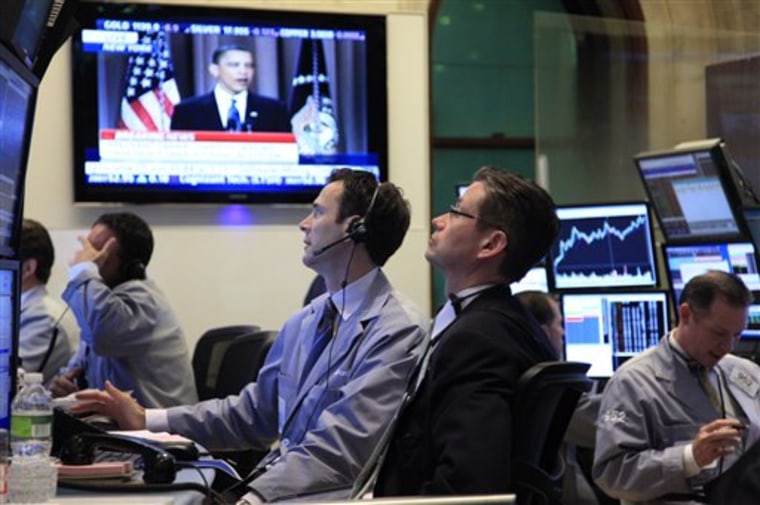Declaring themselves short of patience, Democrats set an initial showdown vote for next Monday on legislation to clamp new regulations on the financial industry while Republicans insisted on more bargaining. President Barack Obama admonished Wall Street leaders "to join us instead of fighting us" to prevent a future national financial collapse.
The test vote loomed in an election-year climate, with lawmakers ready to campaign this summer on the results of this legislation — written in reaction to the economic crisis that threw the nation into recession — as well as the hard-fought health care overhaul.
"The time for stalling is over," declared Senate Democratic leader Harry Reid of Nevada. That drew a quick response from the Republican leader, Mitch McConnell of Kentucky: "I don't think bipartisanship is a waste of time."
Without an accord with the GOP, which was blocking the start of formal debate on the bill, Democrats would need 60 votes to move ahead in the Senate. Despite some signs of wavering, all 41 Republicans in the 100-member Senate remained publicly opposed on Thursday.
Reid was eager to test the Republican resolve, even as bipartisan negotiations continued. Reid conceded that the timetable for a vote could change if the talks bear fruit. Without a bipartisan bargain, Democrats were determined to portray Republicans as Wall Street allies and put them through test votes until enough senators agreed to proceed.
GOP roadblock
Emerging from a late afternoon meeting with Banking Committee Chairman Christopher Dodd, the committee's top Republican, Richard Shelby, said chances of an agreement before Monday's vote were "probably not probable." He predicted Republicans would vote as a bloc to put off action on the bill.
At the same time, senior Democrats signaled Thursday they hope to ease day-old restrictions a Senate committee slapped on the trading of financial derivatives, the complex investments blamed as a contributing factor to the economic near-meltdown of 2008.
The sweeping regulations represent the broadest attempt to overhaul the U.S. financial system since the 1930s. A House-passed bill and the pending Senate version would create a mechanism for liquidating large firms, set up a council to detect systemwide financial threats and establish a consumer protection agency to police lending, credit cards and other bank-customer transactions.

Opinion polls show the public is receptive to new federal curbs on Wall Street after twin catastrophes — the recession that has driven unemployment to double-digits and a banking crisis that has led to huge losses in Americans' retirement accounts.
No details were immediately available on possible changes on derivatives. But the Obama administration and some Senate Democrats have raised concerns over provisions cleared by the Senate Agriculture Committee, including one that would effectively require banks to spin off their derivatives business.
Competing proposals
Reid said the heads of two Senate committees had met to discuss combining competing proposals on derivatives, financial products such as corn futures or stock options whose worth depends on the values of underlying investments. Companies use them to hedge against risks, such as interest rate swings or oil price spikes. But they became a vehicle for speculation and helped trigger the financial crisis when the underlying investments — mortgage-backed securities, for example — plunged in value.
Reid's comments were the first official word that the measure approved on Wednesday by the Agriculture Committee would not go directly to the Senate floor — even though the committee's chair, Sen. Blanche Lincoln of Arkansas, had told reporters she had assurances it would.
Lincoln, who faces a difficult re-election race, reacted with barely disguised anger. The committee "has passed not only the strongest, but the only bipartisan Wall Street reform bill," she said in a statement released to The Associated Press. "This legislation will only strengthen the broader reform bill and it should be incorporated as is and sent straight to the Senate floor."
Obama has made the broader legislation one of his congressional priorities, and in a speech in New York he chastised Wall Street for risky practices at the same time he sought its help for "updated, commonsense" banking regulations to head off any new financial crisis.
At a news conference during the day, top Democrats accused Republicans of falsely claiming a bill approved earlier in the Senate Banking Committee included a $50 billion fund that would be used to bail out failing banks.
"The lies are not taking hold," said Sen. Chuck Schumer, D-N.Y.
Earlier, McConnell challenged Democrats to disprove his claim. "This bill would give the administration the authority to use taxpayer funds to support financial institutions at a time of crisis," he said.
"Yes, that bill says taxpayers get the money back later, but that sounds awfully familiar," he added.
As for derivatives, the Agriculture Committee legislation would require bank companies to spin off those operations, barring them not only from trading in the instruments themselves but also from creating deals for other clients. The objective is to avoid exposing commercial bank operations to the risks of the more speculative business.
The Banking Committee version would prohibit bank companies from engaging in speculative trades with their own accounts, but it would not do away with the ability of banks to create derivatives markets for clients.
Last week, a senior Treasury official indicated a preference for the approach taken by the Banking Committee, and there is additional concern that the alternative could lead to greater concentration in a market where a handful of firms conduct about 80 percent of derivatives business.
